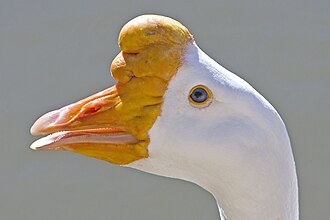Difference between revisions of "AY Honors/Poultry/Chinese Geese"
From Pathfinder Wiki
m (1 revision: re-import from WB, including edit history) |
m (- Category of AYHAB) |
||
| (One intermediate revision by the same user not shown) | |||
| Line 4: | Line 4: | ||
| description = The Chinese Goose is a domesticated version of the Swan Goose. Sexes are similar, although the male is larger. The voice is a loud honking. It grazes on sedges, and rarely swims. It forms small flocks outside the breeding season. Some domesticated, introduced, or feral populations may be completely white. Some variations have a "bump" or "knob" at the top of the beak, which is more prominent on males than females. By 6–8 weeks of age, the knob is already pronounced enough that it can be used for sexing. A female goose usually lays 50–60 eggs over the course of the breeding season (February through June), although there are reports of Chinese geese laying up to 100 eggs during that time. | | description = The Chinese Goose is a domesticated version of the Swan Goose. Sexes are similar, although the male is larger. The voice is a loud honking. It grazes on sedges, and rarely swims. It forms small flocks outside the breeding season. Some domesticated, introduced, or feral populations may be completely white. Some variations have a "bump" or "knob" at the top of the beak, which is more prominent on males than females. By 6–8 weeks of age, the knob is already pronounced enough that it can be used for sexing. A female goose usually lays 50–60 eggs over the course of the breeding season (February through June), although there are reports of Chinese geese laying up to 100 eggs during that time. | ||
}} | }} | ||
| − | |||
| − | |||
Latest revision as of 00:44, 15 July 2022
Chinese Goose
The Chinese Goose is a domesticated version of the Swan Goose. Sexes are similar, although the male is larger. The voice is a loud honking. It grazes on sedges, and rarely swims. It forms small flocks outside the breeding season. Some domesticated, introduced, or feral populations may be completely white. Some variations have a "bump" or "knob" at the top of the beak, which is more prominent on males than females. By 6–8 weeks of age, the knob is already pronounced enough that it can be used for sexing. A female goose usually lays 50–60 eggs over the course of the breeding season (February through June), although there are reports of Chinese geese laying up to 100 eggs during that time.

